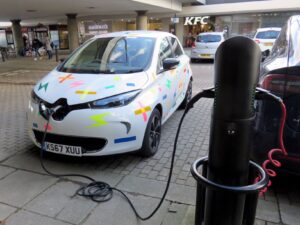In her thought-provoking blog in November, Alice Moncaster expressed the hope that, following COP26’s image of male, white, and wealthy people making decisions, that COP27 would be “redesigned in a way that allows all people to participate equally that works best for them”, concluding that “the most sustainable solutions are those which are designed by everyone”.
Significant transformations inevitably involve the meta level redesign of processes and systems, which is more commonly seen as an area dominated by disciplines such as business studies, sociology, politics, economics, ethics and the like. Framing this as a design issue means that design thinking needs to interact with the approaches of these disciplines. That is the tricky thing – how do you actually do this?
Over the last decade or so I have been part of a group of people from within Design at the OU who have been involved in a number of innovation initiatives driven by the sustainability agenda, in particular with more sustainable transport and energy initiatives locally in Milton Keynes. To do this we have had to tackle the issue of how we work within projects constructed with a top-down mentality and within conceptual frameworks that paid no more than a passing reference to user participation and empowerment.
The first major project in which our OU team was involved immediately hit the situation of a top-down approach devised by an elite intended for a wide range of people who were little involved in the process. Milton Keynes Council welcomed our involvement in their 2008 Plugged in Places(PiP) bid to develop a pioneering network of charging infrastructure for electric vehicles. Embedded in this bid were actions to engage and involve users in the design of the system. Milton Keynes was successful in the bid, but all social engagement was excluded from funding which was just for the installation of hard infrastructure; the only measure of success was the number of charging points installed and switched on. MK Council pushed against this and helped us get alternative funding to put the socio into their socio-technical programme. In practice this more engaged approach has been very successful and Milton Keynes is today seen as a national leader in electric vehicle uptake.
Interestingly, the 2013 PiP report on lessons learnt from the programme (OLEV, 2013) included ‘Understand user/ customer requirements, including how they access chargepoints and other services they receive. Consider what is needed to communicate with potential customers’. The mood music certainly changed; although this is not exactly user empowerment, by this point, the funder had shifted part way to what our OU team did – and what we had been excluded from being funded! Our perseverance in a more inclusive design approach did lead to our team being invited to participate in several more industry-led sustainable transport and energy projects. For these we provided an understanding of user behaviours and practices and the institutional relationships needed to support these innovative developments, including work on smart grids, transport apps, and new public transport system designs.
It was only recently, when we were putting together a 2021 REF impact case, that we realised our part in helping to formulate the way in which Milton Keynes Council now constructs their sustainability projects. One quote was that our participation and support ‘helped provide the council with the confidence to commit to becoming carbon neutral by 2030’ and that ‘the user engagement methods employed by the Open University researchers during PiP encouraged and validated Milton Keynes Council’s decision to develop a new approach, unique to the UK (and possibly Europe) of providing an independent “experience centre’. This is the Electric Vehicles Experience Centre where people can speak with an ‘EV Guru’ and test drive one of the council’s fleet of electric vehicles. Indeed, the UK Government’s 2018 national strategy for cleaner road transport, ‘Road to Zero’, specifically cites this centre as an exemplar of public engagement with electric vehicles.
Our experience of the last 15 years indicates that there is an important mood change taking place in both the more progressive local authorities and among funders. For example, current Innovate UK calls now require a consideration of socio-behavioural factors and expect researchers with this expertise to be a central part of any application. The door is very much open for design thinking type approaches and expertise to become embedded into industry-led sustainability initiatives. Perhaps the onus is now on how we learn to engage effectively with non-design practitioners to complement the work of other disciplines and ensure that the understandings our approach provides are accepted and valued.
References
Office for Low Emission Vehicles (2013), Lessons Learnt from the Plugged-in Places Projects, OLEV, July
Department for Transport (2018): The UK Government’s 2018 national strategy for cleaner road transport, Road to Zero: https://assets.publishing.service.gov.uk/government/uploads/system/uploads/attachment_data/file/739460/road-to-zero.pdf


Leave a Reply